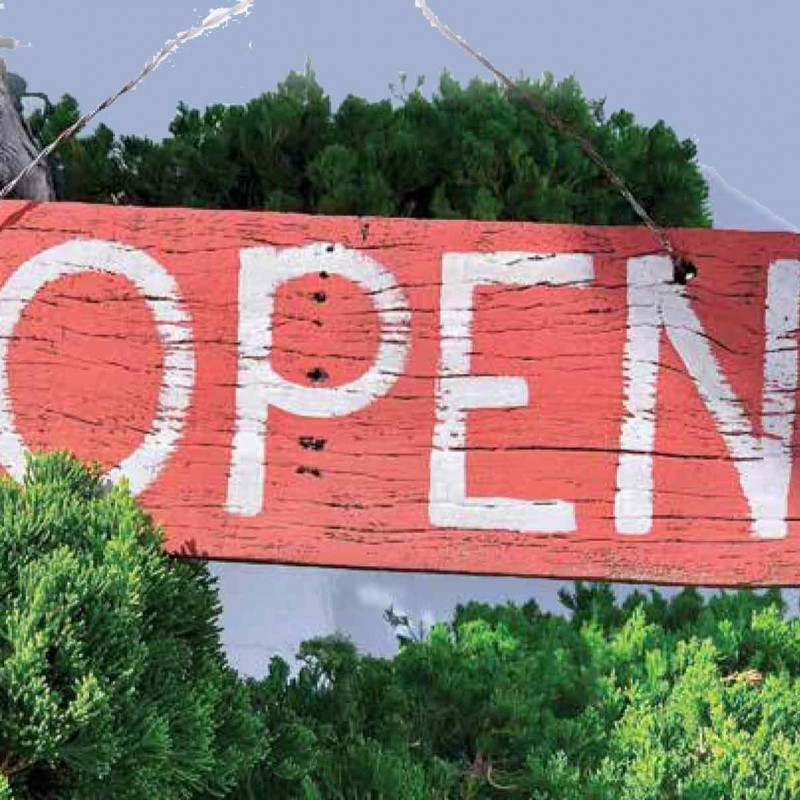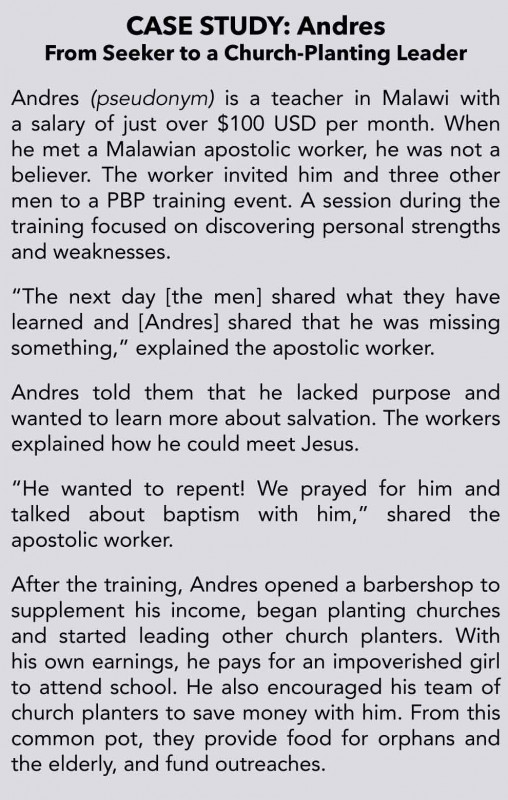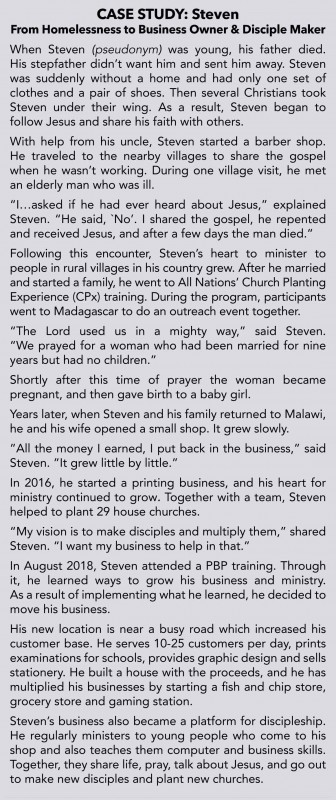Business for Movements

“We started to teach four men about business,” explained a Malawian apostolic worker. “One of them was Andres (pseudonym), a seeker. We shared the section in the training about our strengths and weaknesses. The next day they shared what they have learned and [Andres] shared that he was missing something. He doesn’t have a purpose, and he wants to know more. We shared about salvation, how to repent and meet Jesus. He wanted to learn more about salvation. He wanted to repent! We prayed for him and talked about baptism with him.” See Andres’ case study.
The next decade belongs to Business for Movements (B4M) because the peoples who most urgently need a gospel breakthrough and church movements are in places with the least resources, infrastructure and access. B4M goes where the Church is not. It pioneers Christward movements among Frontier People Groups (FPGs) with no gospel or church-planting breakthroughs.
The Movement Model
B4M is a movement. Numerous books, case studies and articles record strategies and methodologies related to Christian, church-planting, disciple-making, and prayer movements. We often classify them as miraculous or supernatural, but the Bible is clear that movements are an expected outcome of the work of the Church.
If we look at movement models in the book of Acts, we find that when faithful and diligent believers respond in obedience to the direction of the Holy Spirit, movements result. Biblical movements are not compartmentalized. Instead, these movements represent a seamless convergence of abundant church-planting, prolific disciple-making, fervent prayer and thriving businesses among apostolic workers.
If appropriate sustainability mechanisms are not in place, rapidly multiplying Church Planting Movements may outpace financial resources. Apostolic leaders may be left without means to feed their families or to travel to support and grow the movement. This may halt or significantly delay church-planting movements. The strength of these movements can, therefore, be measured by their capacity to be sustainable from within.
Pioneer Business Planting
One of the key B4M initiatives is Pioneer Business Planting (PBP). It is patterned after movement dynamics and it fuels and sustains church-planting movements where no churches exist. PBP also accelerates access to the least reached people and unreached places of the world. Business creates sustainability for apostolic workers while simultaneously giving unreached people and places access to the gospel.
PBP incorporates several core movement characteristics including:
- using orality to train
- focusing on principles of simplicity and multiplication
- empowering and developing local leaders
- working with local people to address local needs using local resources first
- cultivating learning attitudes
- honoring local cultures
- providing ongoing coaching and discipleship
- incorporating biblical principles of stewardship, ethics, and business
Progress in Asia and Africa
In Asia and Africa, we observed significant movements of FPGs coming to Christ through business conducted in strategic locations by apostolic workers. This powerfully influences regions that would otherwise remain isolated from the message of the gospel.
For example, since 2017, 1,000 apostolic workers in Malawi participated in PBP with 400 businesses that started alongside 100 house church plants (some of which were already there before PBP). In Indonesia, 500 apostolic workers attended PBP training and have operated businesses among FPGs for more than five years bearing fruit in very difficult places.
Over the past 10 years, PBP expanded to 45 countries in Asia and Africa. Over 2,500 businesses operated by both indigenous and close-culture church planters were launched.


Imagine a world with thousands of Stevens and Andreses reaching and discipling unreached peoples! We anticipate that the next decade will be a decade of opportunity for PBP movements alongside Church Planting Movements. Based on what we experienced in the past decade, we believe that business movements will play a significant role in extending the reach of the gospel. This will happen as a result of prayer, influencers, shifts in global partnerships, growth in national/indigenous leadership, global workforce funding and even persecution.
Ordinary people that love Jesus strategically and intentionally planting ordinary businesses will take the gospel to the remaining hard places. It will demand a posture of humility. It will require equipping, engaging, and empowering global south apostolic workers in B4M methodology. It will result in extending the reach of the gospel in Frontier People Groups while making an economic, social and spiritual impact in the community. We can make this happen by facilitating conversation, being active learners, listening, storytelling and leading hands on experiential learning through activity-based modeling.







comments